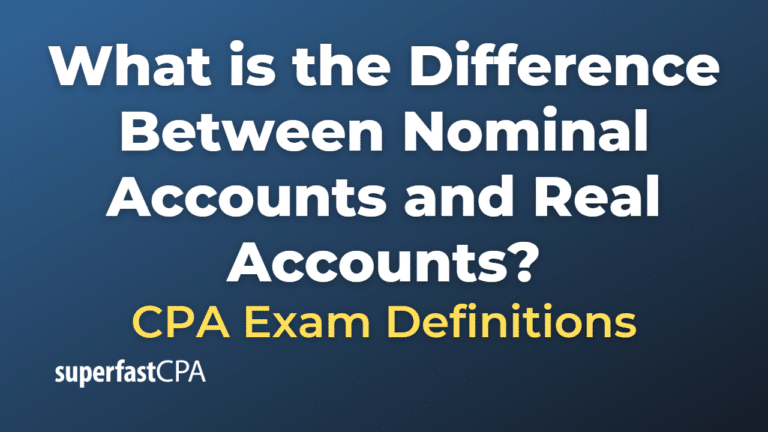
The closing of nominal accounts does not just reset their balances; it also updates the equity, which in turn reshapes the accounting equation. This cyclical process ensures that the accounting equation remains balanced and that the financial statements accurately reflect the company’s financial status. Nominal accounts play a pivotal role in the financial reporting process, serving as a cornerstone for businesses to track their income and expenses over a specific period. These accounts are essential for providing stakeholders with transparent and accurate insights into a company’s financial performance. For nominal accounts, debit the account if it represents an expense or loss and credit if it represents revenue or gain. In contrast, real accounts follow the principle of debit what comes in and credit what goes out, and personal accounts follow the principle of debit the receiver and credit the giver.
Nominal vs. Real
A golden rule with nominal accounts is that you’re always going to debit all your expenses and losses. Understanding these processes helps with cash flows, profit balance, and your financial reporting. Nominal accounts are integral to the accounting process, providing a systematic way to measure financial activity within a given timeframe. They are temporary accounts that are closed at the end of the accounting period, which helps in preparing the company’s financial statements.

AccountingTools
- The updated equity then provides stakeholders with a measure of the company’s financial health and the efficacy of its operations for that period.
- Used for evaluating the financial stability and liquidity of the business.
- Either way, bookkeeping is going to include real accounts as well as nominal accounts.
- This type of account includes all expenses, revenues, losses, and gains that are incurred within the financial year.
All the accounts in trial balance will form the financial statements which include income statement, balance sheet, change in equity and cash flow. The role of nominal accounts extends beyond the formation of the income statement. They also influence the statement of retained earnings, which reconciles the net income earned during a period, and any dividends paid, with the change in retained earnings. Since nominal accounts are closed to the retained earnings account, they directly affect the equity of a company and, by extension, the balance sheet. The nominal account is an income statement account (expenses, income, loss, profit).
Statement of Retained Earnings
Important to know about Real Accounts – In spite of the fact that “debtors” are assets for the company, they continue to be classified as personal accounts. This is because ‘debtors’ belong to individuals or entities and personal accounts specifically serve the purpose of calculating balances due to or due from such 3rd parties. A company’s financial data becomes unreliable when debit and credit rules are incorrectly applied.
Why You Can Trust Finance Strategists
Cash is a Real account so Dr. what comes in (9,500), Discount Allowed A/c is a Nominal account so Dr. all expenses/losses (500), and Unreal Co. Representative personal accounts represent a certain person or a group. Personal accounts created by law are called artificial personal accounts.
The golden rules are dependent on the accurate classification of the account. After that, the balance is transferred in a T-shaped table that contains all debit transactions on the lef, and the right-hand side includes all credit transactions. Usually, real accounts are listed in the what is the definition of outsourcing balance sheet of the business. For this reason, they are sometimes referred to as balance sheet accounts. They’re different from the balance sheet as they are considered only ‘temporary accounts’. They begin with a zero balance and are closed at the end of each accounting year.
And when you deal with nominal accounts, you also handle real accounts. A nominal account is a general ledger account that you close at the end of each accounting year. Basically, you store accounting transactions in a nominal account for one fiscal year. At the end of the fiscal year, you transfer the balances in the account to a permanent account. After the closing process, each nominal account starts the next accounting year with a balance of zero.
The good news is that doing this process doesn’t have to be a huge challenge. Most accounting and bookkeeping software will do it for you automatically. Doing it this way might even mean you won’t need to have an income summary account. This is because the software can add your income and expenses and then transfer the amount to your retained earnings. To make recording transactions easier, you may also consider using accounting software to streamline processes.
Personal accounts are the accounts that are used to record transactions relating to individual persons, firms, companies, or other organizations. While it’s not mandatory, hiring an accountant can be beneficial for managing finances, ensuring compliance with tax laws, and providing financial advice. However, many small business owners manage their own accounting using software or spreadsheets. CAs, experts and businesses can get GST ready with Clear GST software & certification course. Our GST Software helps CAs, tax experts & business to manage returns & invoices in an easy manner.


